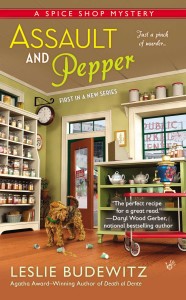by Leslie Budewitz, @LeslieBudewitz 
I take a methodical approach to revision. As I work on the draft, I start a list of “Revision Notes”—facts to check, inconsistencies to iron out, name changes to clean up. When the draft is complete I print it out and punch it into a fat, three-ring binder. I make an outline, adding to the Revision Notes as I go, with some comments organized by chapter and some by topic. (“Jen or Jenn?;” “Deepen Pepper’s doubts about investigating;” “Kristen lecture Pepper about getting involved with Tag twice? Earlier is better.”)
Then I start the read-throughs, which I sometimes call drafts even though I’m working from the same physical copy. Each read-through involves a different layer of the ms. In the plot draft, I fix the holes I’ve identified in the outline and others that jump out at me as I work. In the character draft, I make sure the protagonist drives the action (I write in first person) and that every secondary character pops. In the scene draft, I sharpen the goals, motivation, and conflicts, and make each transition clear, so the reader never wonders about time or place. I look to make sure I’ve kept it cozy, that I’ve never lost track of the dog, and that I’ve given my protagonist all the trouble she can handle—and then some.
But the final step may be the most important, because it introduces a key element to my otherwise orderly process: randomization. That’s the “Repetitive Word draft.” Like every writer, I’ve got my pet words: still, only, really, turn, smile, perfect. Every book seems to develop its own overused vocabulary. This stage eliminates unconscious echoes, and helps me sharpen my characters’ observations and introduce more variety and vibrance. In my latest ms., second in my Spice Shop Mysteries, my protagonist Pepper seemed to adore everything she didn’t find odd; she laughed too much, and overused the word figure, in a variety of contexts. Chili and chile went on the list because I continually mistyped them, as did Viaduct, a proper noun when referring to the elevated highway running along the Seattle waterfront. In my Food Lovers’ Village Mysteries, I tend to repeat fresh and local. (Worthy concepts; overused words.) After I read a blog post on describing characters’ voices, I got a little carried away with that aspect of craft, so voice and tone went on the list.
But even more than making sure I don’t turn head into a synonym for walk three times on the same page, this process helps me catch (spot, nab) repetitive structure. I use the Find function, jumping from one instance of the target word to the next. I may land on two consecutive pages or skip several chapters. By taking context out of the picture, I can see what I’ve actually written—not what I think I’ve written. I’m not reading chronologically, so it’s easier to recognize repetitive thoughts or phrases and unnecessary sentences. An overused phrase often indicates a clause or sentence that can be eliminated. Sometimes it’s a filtering phrase—“I thought…”, “… caught my attention,” “I felt…”—that creates a distance between narrator and reader. Deleting it allows me to go a touch deeper into my protagonist’s POV.
Some overuses are easy to overlook because words like could, with, and though are so ordinary, so necessary. Do I really replace a good chunk of them? Yes and no. The eye scans over many of these words, and often, they are exactly the right word. But the real importance of the exercise is to show me where I’ve been tentative instead of bold, made a phrase conditional, pulled punches in my dialogue.
An example of a word that shows up too often in the same way—at least for me; your linguistic quirks may vary—is with. I tend to toss it into descriptions far too often. For example, my protagonist, Pepper Reece, describes a chef who comes into her shop this way: “Tamara vibrated with intensity, her presence boosting everyone around her to a higher frequency.” And only seven lines later, Pepper thinks of her this way: “Thin and wiry—from hard work, not workouts—her features too intense to call pretty. But she buzzed with an irresistible energy.” It’s a common sentence structure, but not one for every page.
These searches show us our weak spots.
Because of the random factor, I sometimes notice unnecessary words or phrases apart from those I’m searching for. And though I’ve already deleted dozens of throat-clearing phrases and eliminated thoughts or phrases that belonged in earlier drafts but don’t relate to action in the current version, I still find those stragglers, artifacts of previous thoughts that no longer fit. Out they go. They’re easier to spot when you’re not reading for substance. As a bonus, you may spot missing words or punctuation errors, too, because when the eye sees out of context, it doesn’t make the automatic corrections that trip us up.
For a 75,000 word ms., the process may take me two days. It can be tedious. But I can eliminate several hundred words without eliminating action. And the real payoff is a stronger, tighter manuscript.
Leslie Budewitz is the national best-selling author of DEATH AL DENTE, first in the  Food Lovers’ Village Mysteries set in northwest Montana, and winner of the 2013 Agatha Award for Best First Novel, and the sequel, CRIME RIB (2014). ASSAULT & PEPPER, first in her Spice Shop Mysteries will debut in March 2015 from Berkley Prime Crime. Pepper Reece, owner of the Seattle Spice Shop, thinks she can handle any kind of salty customer—until a murderer ends up in the mix…
Food Lovers’ Village Mysteries set in northwest Montana, and winner of the 2013 Agatha Award for Best First Novel, and the sequel, CRIME RIB (2014). ASSAULT & PEPPER, first in her Spice Shop Mysteries will debut in March 2015 from Berkley Prime Crime. Pepper Reece, owner of the Seattle Spice Shop, thinks she can handle any kind of salty customer—until a murderer ends up in the mix…
Also a lawyer, Leslie won the 2011 Agatha Award for Best Nonfiction for BOOKS, CROOKS & COUNSELORS: HOW TO WRITE ACCURATELY ABOUT CRIMINAL LAW & COURTROOM PROCEDURE (Quill Driver Books), making her the first author to win Agatha Awards for both fiction and nonfiction.
Leslie blogs for writers on using the law accurately in their fiction. Visit her blog. http://www.LeslieBudewitz.com/blog
Find her on Facebook http://www.Facebook.com/LeslieBudewitzAuthor
or on Twitter http://www.Twitter.com/LeslieBudewitz
I use that find feature as I have quite a few favorite words and phrases I overuse. Even when I know I overuse them.
Thanks, Alex. Now take it a step further, and see if you can use the repetitive word search to find repetitive thoughts and sentence structures as well!
Elizabeth – Thanks for hosting Leslie.
Leslie – I think you have a really interesting approach to revising, and I’ll bet the fact that you do it methodically is especially helpful. I think some sort of structured approach like that helps the writer to use revising time as efficiently as possible, as well as making sure the finished product is cohesive. Thanks for these ideas.
Margot, you’re welcome, and I hope this gives you some ideas for approaching your next revision a little differently!
I’m trying to find my repeatable process in this very revision cycle. Thanks for sharing yours!
I did spit my coffee a little over “may take me two days…”
At least that shows me that the process cycles can get faster! Work to do. Work to do.
Great guest post. Loved it.
Jack
Thanks, Jack. The two days is just for the repetitive word search — and they can be two long days! I hope I’ve given you some useful ideas.
I’ve really started doing that with my work. The repetition is so easy to miss.
Glad it’s a useful tool, Diane!
Since I am not a writer, but an avid reader words and over usage of them really does not even get noticed. I am one of those readers that skips over words such as with, at, that, and the like. Most times they dont matter. I actually enjoy a series that has the same voice for a character. It is like I am getting used to their verbiage and banter. Now I have some serious problems with over use of certain words. I find myself cringing in disgust when I see my replies to people that always use basically the same words. Well, I guess I am just deficient in my wording. Thanks for the information on this process. Very interesting, for sure(one of my over used words, as in always used). Hey I am a southerner and we over use some words for sure! LOL
Every region has its phrases, don’t they? Thanks for stopping by!
Good luck to Leslie. Intersting names for book titles. Good thing my editor catches all my repetitive stuff. I did a word search on my for book for the word “quickly. It appeared over 100 times. I deleted all but a few and the text read so much better.
Sounds like that’s first on your repetitive word list, Stephen! We all have our faves! Thanks for stopping by.
Excellent post, Leslie! My protagonist was being grabbed, yanked, and pulled by people. I didn’t catch but fortunately Barb Goffman — my eagle-eyed editor did. This is an excellent reminder to search beyond repetitive words.
Thanks, Sherry. I love how the process allowed me to go one step further and discovery repetitive phrases and sentence structures. Congratulations on your Agatha Award nomination for Best First Novel!
Hi Leslie,
Wonderful post. I’ve mentioned here before that, although I love to write, I don’t enjoy editing. I’d just about rather do anything. I’ve been procrastinating terribly and have committed to finish editting my next two books before I write another one. I’ll be the first to admit that it’s because I haven’t learned all the tricks to make it easier. This will help.
I better go. I was thinking of cleaning the windows. It’s the middle of winter, but… :)
Silas, my approach might seem a little too methodical for some people — it’s probably a remnant of 30 years of writing legal briefs! — but I hope it gives you some ideas for making the process work better for you. Maybe even make it a little bit fun? Good luck!
Thanks, Elizabeth, for hosting me, and to all for reading and sharing a thought or two!
Leslie–Thanks so much for being here and for your insight! I love your approach to revision.
I’m so bad with echoes and repetitive words. And I end up replacing many other words that I then repeat all over again and don’t realize that. It’s the only part of the writing process that I dislike.
Stick with it, Carol, and you’ll find the process that works for you. You might try reading a ms. out loud — highly educational experience! Good luck with the WIP.
This is a great process! I’m in midst of going through my crutch words. You’re right…this is a time when I spot all kinds of repetitive stuff. Not just the over use of way too many words, but repeating sentence structure and points I’ve hammered in too often.
Julie, so glad this strikes a chord with you! Good luck with the WIP.